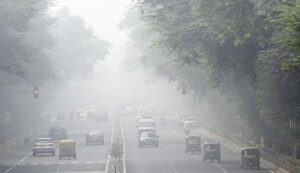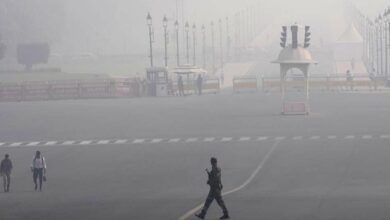Thick fog engulfs Delhi, air quality still in ‘the severe’ category
New Delhi: According to the Central Pollution Control Board, Delhi woke up to “very poor” air quality on Tuesday morning, which was a tiny improvement over the previous week’s “severe” air quality. According to the Central Pollution Control Board, the Air Quality Index (AQI) at 7 am was 382, which is classified as “very poor.”

As the Air Quality Index in a number of locations remained in the ‘Very Poor’ category, a dense blanket of haze enveloped the National Capital.
In the meantime, trains continued to operate through the pollution close to New Delhi Railway Station.
For four or five days throughout the last week, the metropolitan city’s air quality index was in the “severe plus” category.
AQI values fall into one of the following categories: acceptable (zero to fifty), satisfactory (51 to 100), moderate (101 to 200), poor (201 to 300), extremely poor (301 to 400), and severe (401 to 500).
The Delhi Government’s Directorate of Education instructed all schools in the nation’s capital to abide by the CAQM’s directive earlier on Monday.
According to the CAQM order, “State governments in the NCR shall ensure that all classes up to 12th Standard are conducted in a ‘hybrid’ mode, i.e., both in “physical” and also in “online” modes, wherever online mode is feasible in the districts of Gautam Buddh Nagar, Ahmedabad, Gurugram, and Faridabad in the NCR.”
In accordance with the CAQM order, the Delhi Cantonment Board, NDMC, MCD, and heads of all government-aided and unaided private schools under its jurisdiction have been instructed by the Directorate of Education, Government of Delhi, to begin offering hybrid classes to students in all classes immediately until further directives.
This ruling comes after the Supreme Court ordered the CAQM to examine GRAP limitations in light of their effects on education in the case of MC Mehta vs. Union of India, which was decided on November 25. The court raised a number of issues while highlighting the need for giving education first priority.
First of all, the court remarked, “A large number of students are being deprived of the facility of mid-day meals as schools and anganwadis are closed.”
It went on to say, “Many students lack the resources necessary to benefit from online learning. Many schools lack the resources necessary to provide online instruction.
Additionally, the court stated, “The residences of many students do not have air purifiers, and therefore, there may not be any difference between children sitting at home and those attending school.”




